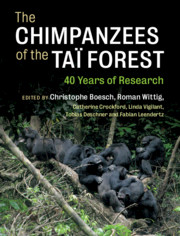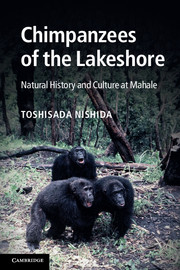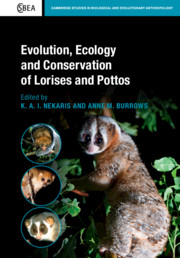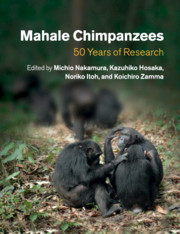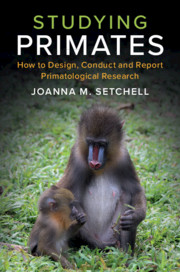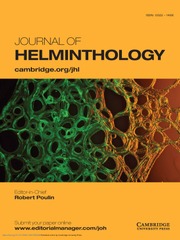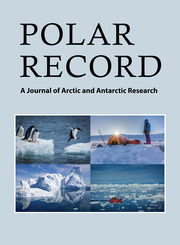The Chimpanzees of the Taï Forest
The Taï Chimpanzee Project (Taï National Park, Cote D'Ivoire) has yielded unprecedented insights into the nature of cooperation, cognition, and culture in our closest living relatives. Founded in 1979 by Christophe and Hedwige Boesch, the project has entered its 40th year of continuous research. Alongside other famous long-term chimpanzee study sites at Gombe and Mahale in East Africa, the tireless work of the team at Taï has contributed to the fields of behavioural ecology and anthropology, as well as improving public awareness of the urgent need to protect this already endangered species. Encompassing important research topics including chimpanzee ecology, reproductive behaviour, tool use, culture, communication, cognition and conservation, this book provides an engaging account of how Taï chimpanzees are adapted to African jungle life and how they have developed unique forms of cooperation with less violence, regular adoptions and complex cultural differences between groups.
- Celebrates the 40th anniversary of the Taï Chimpanzee Project by bringing together invaluable contributions and highlighting the key findings on this population
- Provides new insights into the cultural and social aspects of chimpanzee behaviour, opening a new window into the socio-ecological flexibility of Taï chimpanzees
- Offers a valuable insight for comparison to the traits of other populations of chimpanzees as well as human
Reviews & endorsements
'… this is a substantial book that is a 'must-have' on any primatologist's bookshelf …' William C. McGrew , Primates
Product details
January 2020Hardback
9781108481557
516 pages
253 × 194 × 26 mm
1.19kg
114 b/w illus.
Available
Table of Contents
- Introduction
- 1. War and peace in the Taï Chimpanzee Project: running a long-term Chimpanzee research project Christophe Boesch
- 2. Developments in statistical methods applied over four decades of research, Taï Chimpanzee Project Roger Mundry
- 3. Observation protocol and long-term data collection in Taï Roman Wittig and Christophe Boesch
- 4. The Wild Chimpanzee Foundation (WCF) and the Taï Chimpanzee Project (TCP) Emmanuelle Normand, Ilka Herbinger, Joseph Kouassi and Yves A. Kablan
- 5. Insights from genetic analyses of the Taï chimpanzees Linda Vigilant
- 6. Endocrinological analyses at Taï Tobias Deschner and Verena Behringer
- 7. Chimpanzee behavioural diversity and the contribution of the Taï Chimpanzee Project Christophe Boesch
- 8. An energetic model of foraging optimisation: wild chimpanzee hammer selection for nut-cracking Giulia Sirianni, Lydia Luncz and Paolo Gratton
- 9. Demography and life history of five chimpanzee communities in Taï National Park Christophe Boesch and Roman Wittig
- 10. Adoption in the Taï chimpanzees: costs, benefits, and strong social relationships Liran Samuni, Roman Wittig and Catherine Crockford
- 11. Spatial integration of unusually high numbers of immigrant females into the South Group: further support for the bisexually-bonded model in Taï chimpanzees Sylvain Lemoine, Catherine Crockford and Roman Wittig
- 12. Forty years striving to capture culture among the Taï chimpanzees Christophe Boesch
- 13. Cultural diversity of nut-cracking behaviour between two populations of wild chimpanzees (pan troglodytes verus) in the Côte d'Ivoire Lydia Luncz, Roger Mundry, Serge Soiret and Christophe Boesch
- 14. Ecological and social influences on rates of social play in immature wild chimpanzees (pan troglodytes verus) Yasmin Moebius, Peter Walsh, Grégoire Kohou and Christophe Boesch
- 15. Long-term diet of the chimpanzees (pan troglodytes verus) in Taï National Park: inter-annual variations in consumption Zoro Bertin Gone Bi and Roman Wittig
- 16. Why Taï Mangabeys do not use tools to crack nuts like sympatric-living chimpanzees: a cognitive limitation on monkey feeding ecology Karline Janmaat and Richard Byrn
- 17. Providing research for conservation from long-term field sites Marie-Lyne Després-Einspenner, Yves A. Kablan, Celestin Kouakou, Hjalmar Kühl and Paul N'Goran
- 18. Rank changes in female chimpanzees in Taï National Park Alexander Mielke, Catherine Crockford and Roman Wittig
- 19. Effects of large-scale knockouts on chimpanzee association networks Julia Riedel, Christophe Boesch and Mathias Franz
- 20. Why do the chimpanzees of the Taï Forest share meat? The value of bartering, begging, and hunting Cristina Gomes, Roger Mundry and Christophe Boesch
- 21. Group specific social dynamics affect urinary oxytocin levels in Taï male chimpanzees Anna Preis, Liran Samuni, Tobias Deschner, Catherine Crockford and Roman Wittig
- 22. The chimpanzees of the Taï Forest as models for hominine microorganism ecology and evolution Jan Gogarten, Grit Schubert, Fabian Leendertz and Sébastien Calvignac-Spencer
- 23. Acute infectious diseases occurring in the Taï chimpanzee population: a review Livia Victoria Patrono and Fabian Leendertz
- 24. Why does the chimpanzee vocal repertoire remain poorly understood? And what can be done about it Catherine Crockford
- 25. Sexual dimorphism in chimpanzee vocalisations: a comparison of male and female call production and acoustic parameters Ammie Kalan
- 26. Gestural usage and development in two subspecies of wild chimpanzees (pan troglodytes Schweinfurthii/Verus) Marlen Fröhlich and Simone Pika
- 27. Spatial cognitive abilities in foraging chimpanzees Simone Ban and Emmanuelle Normand
- 28. Temporal cognition in Taï chimpanzees Karline Janmaat.

